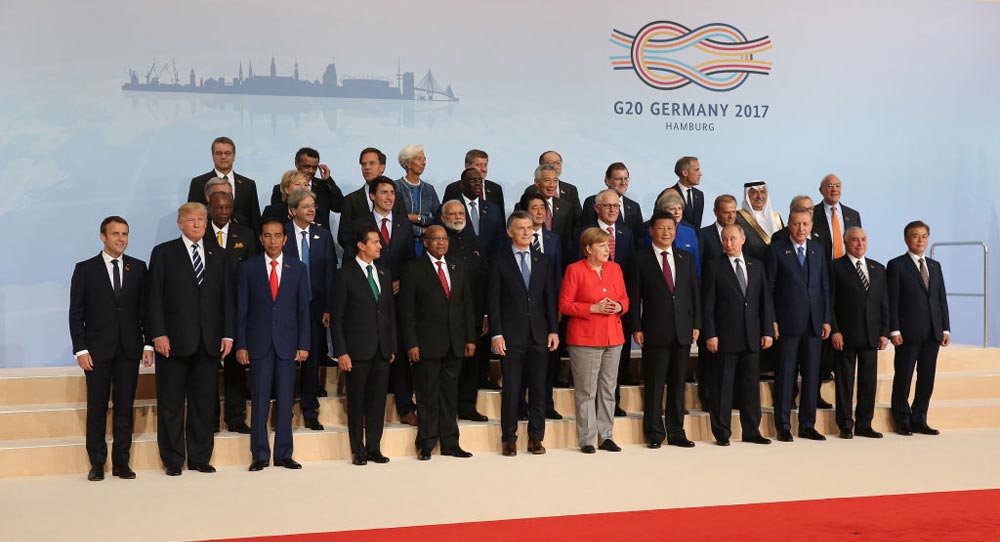The G20 summit that ended on July 8 in the German port of Hamburg showed the extent of the gap between the United States, its European allies, and the other members of the G20. There were differences over pursuing a rules-based international trading system and, as expected, over tackling climate change.
U.S. President Donald Trump got what he wanted from the final communiqué, which was agreed just hours before the summit ended. It showed the immense difficulties in finding language that all leaders could sign off on.
Reluctantly, leaders agreed to include in the communiqué America’s decision to withdraw from the Paris Agreement on climate change. If that was not enough, the U.S. delegation also inserted into the text that it would “endeavour to work closely with other countries to help them access and use fossil fuels more cleanly and efficiently.”
German Chancellor Angela Merkel, who hosted the summit, didn’t mince her words about the outcome. “In the end, the negotiations on climate reflect dissent – all against the United States of America,” she told reporters. “And the fact that negotiations on trade were extraordinarily difficult is due to specific positions that the United States has taken,” Merkel added. She could have gone further. The G20 confirmed the fragility of multilateralism and implicitly questioned whether Europe was in a position to strengthen it.
The United States has always swung between multilateralism and unilateralism. But by putting America first, Trump is leading a slow and steady campaign against the institutions that were established after 1945 and have stood the West in good stead.
But not for much longer. China continues to grow economically, politically, and strategically. Its sheer size and strength are already challenging the West. Trump’s trade policies, such as abandoning the Trans-Pacific Partnership, hands China a golden platter.
A disengaged United States could also undermine the rules-based international trading system, unless the European Union becomes strong and united enough to stem the decline of the West. As it is, the decision by Britain to leave the EU has left the bloc politically, economically, and strategically weaker. But this trend could be reversed in several ways.
The first is Merkel’s role. Even though there were no other leaders to give the EU a new sense of direction, Merkel somehow didn’t want to take on that specific role.
This may seem a contradiction in terms. It was the German government that took the lead in the euro crisis through ramming home tough austerity measures for Greece and other indebted eurozone countries. It was Merkel who kept the EU together over imposing and rolling over sanctions on Russia after its annexation of Crimea. And it was Merkel who decided to give security and shelter to nearly 1 million refugees fleeing the wars in Syria and Iraq.
But when it came to setting an agenda for Europe, Merkel has consistently held back. This could now change, because for the first time since taking office in 2005, Merkel has competition. Emmanuel Macron, the Europhile French president, is in a hurry to move Europe forward. This is the second way the EU could halt its decline.
Once the German federal election in September is over, Macron not only intends to revive the Franco-German axis, which has traditionally moved Europe toward more integration. He also wants to hold a series of conventions with other countries. “France must take the initiative. I want to do it thanks to the close cooperation I have already started with the German Chancellor,” Macron said. “By the end of this year, and on this basis, we will launch democratic conventions all across Europe. It will be up to each one of us to sign up to it or not.”
This is important. Macron needs as many allies as possible if he wants a more integrated Europe, economically and politically. In the long term, this effort is about Europe being able to cope with a disengaged United States. It is also about Europe being prepared to protect the values of the West.
That is why the European Commission, the EU’s executive, also has a crucial role to play when it comes to protecting and extending a rules-based international trading system. The trade accord that the EU reached with Japan on the eve of the G20 summit was crucial for both parties. Japan has no illusions about China’s future role in the region and elsewhere. The commission recognizes the huge importance of defending and extending free trade, particularly given Trump’s views on multilateralism.
And that was the major message that came out of the G20 summit: the need to protect multilateral institutions. Yes, these institutions are difficult, cumbersome, bureaucratic, and so reliant on consensus that decisions are often diluted. But going it alone is not an option, even for the United States.
The other message from the summit, and an even more daunting challenge, was the need to make globalization more inclusive. “Globalisation has created challenges and its benefits have not been shared widely enough,” the communiqué stated. The inference was plain for all leaders. Populism is one of the symptoms of globalization.
Macron and Merkel are acutely aware of this. Despite a feel-good factor taking hold in several EU countries, Macron’s election doesn’t mean populism has been put to bed. But it does mean that Europe’s future is back on the agenda.






.jpg)